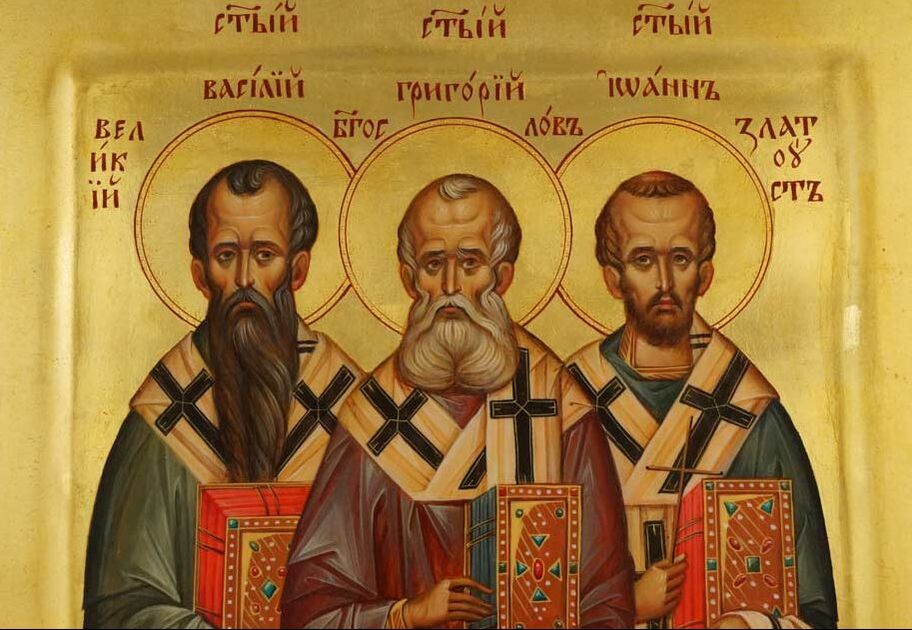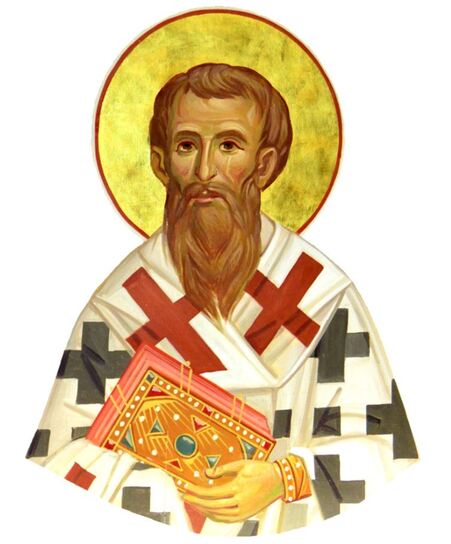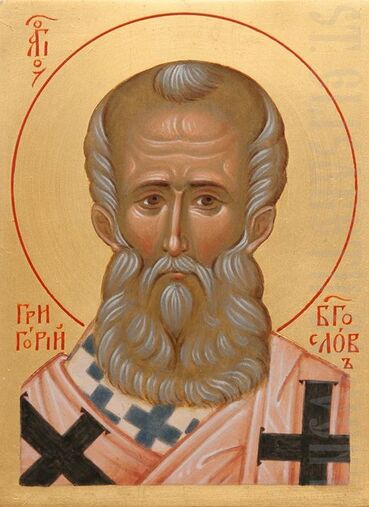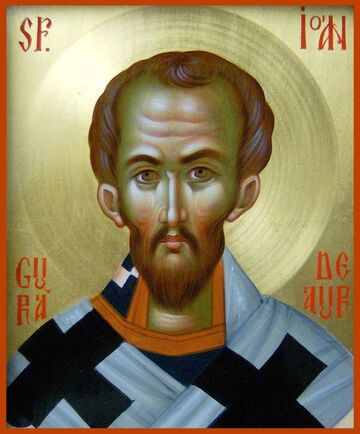What is SOFIA?
|
SOFIA is the Orthodox Christian fellowship for the University of Sydney. With weekly talks, annual forums, and frequent social and outreach events, we are an active part of the University. We maintain an Orthodox presence on campus for Orthodox Christians of all ethnicities.
|
Weekly TalksWe meet up every week to hear about and discuss topics of relevance for living an Orthodox life. These topics could be anything from Great Lent to Orthodox living in the 21st century. Guest speakers are brought in for these talks.
Social EventsIn conjunction with our sister society at UNSW, we run social events which aim to bring together our university community. These are both on and off campus.
|
Annual ForumOur annual forum brings together Orthodox Christian students from universities across Sydney for an in-depth exploration of topics relevant to Orthodox students by a range of keynote speakers.
Outreach EventsWe reach out to the university community at large through our book stalls, charity bake sales and our involvement in the Interfaith events run by the USU.
|
Our Patron Saints - The Three Hierarchs
"All three saints lived exemplary lives, living the words they preached, exhorting those who had fallen away or were living a worldly, sinful life to come back to the faith, and be cleansed. They stood up against attacks, and held their ground, not only in the things they said and wrote, but in the way they conducted themselves." (OCN)
The patron saints of SOPHIA are the Three Hierarchs: Saints Basil the Great, Gregory the Theologian, and John Chrysostom. During the eleventh century, a dispute arose among the Christians as to which of the three was the greatest. Through the will of God, the Three Hierarchs appeared to Saint John, Bishop of Euchaita, saying that they were all equal in the eyes of God, and that “there are no divisions among us, and no opposition to one another.” Therefore, the Bishop ordered that the disputes cease and that the Church in her wisdom ordain a day of common commemoration of the Three Hierarchs, thus ending the controversy in peace. Together, they are considered the patron saints of education, shining as examples of holiness for all Orthodox Christian students. May they intercede for us always!
The patron saints of SOPHIA are the Three Hierarchs: Saints Basil the Great, Gregory the Theologian, and John Chrysostom. During the eleventh century, a dispute arose among the Christians as to which of the three was the greatest. Through the will of God, the Three Hierarchs appeared to Saint John, Bishop of Euchaita, saying that they were all equal in the eyes of God, and that “there are no divisions among us, and no opposition to one another.” Therefore, the Bishop ordered that the disputes cease and that the Church in her wisdom ordain a day of common commemoration of the Three Hierarchs, thus ending the controversy in peace. Together, they are considered the patron saints of education, shining as examples of holiness for all Orthodox Christian students. May they intercede for us always!
-
St Basil
-
St Gregory
-
St John Chrysostom
<
>
“A tree is known by its fruit; a man by his deeds. A good deed is never lost; he who sows courtesy reaps friendship, and he who sows kindness gathers love.”
- St Basil the Great
Saint Basil was born during the reign of Emperor Constantine. While still unbaptized, he spent fifteen years in Athens, where he studied philosophy, rhetoric, astronomy and all the other secular sciences of that time. His colleagues there were Gregory the Theologian and Julian, later the apostate emperor. In his mature years he was baptized in the Jordan River along with Ebulios, his former teacher. He was Bishop of Caesarea in Cappadocia for almost ten years and completed his earthly life fifty years after his birth. He was a great defender of Orthodoxy, a great light of moral purity, a religious zealot, a great theological mind, and a great builder and pillar of the Church of God. Basil truly deserved the title “Great.” In liturgical services he is referred to as the “bee of the Church of Christ, which brings honey to the faithful and with its stinger pricks the heretics.” Numerous works of this Father of the Church are preserved; they include theological, apologetical, ascetical and canonical writings, as well as the Holy and Divine Liturgy named after him. This Divine Liturgy is celebrated ten times during the year: on the first of January, his feast day; on the eve of the Nativity of our Lord; on the eve of the Theophany of our Lord; on all Sundays of Great Lent except Palm Sunday; on Great and Holy Thursday; and on Great and Holy Saturday. St. Basil reposed peacefully on January 1, 379, and entered into the Kingdom of Christ. May he intercede for us always!
Source: https://www.gometropolis.org/orthodox-faith/feast-days/saint-basil-the-great-archbishop-of-caesarea/
Your proclamation has gone out into all the earth
which was divinely taught by hearing your voice
expounding the nature of creatures,
ennobling the manners of men.
O holy father of a royal priesthood,
entreat Christ God that our souls may be saved.
- Troparion of St Basil, Tone 1
- St Basil the Great
Saint Basil was born during the reign of Emperor Constantine. While still unbaptized, he spent fifteen years in Athens, where he studied philosophy, rhetoric, astronomy and all the other secular sciences of that time. His colleagues there were Gregory the Theologian and Julian, later the apostate emperor. In his mature years he was baptized in the Jordan River along with Ebulios, his former teacher. He was Bishop of Caesarea in Cappadocia for almost ten years and completed his earthly life fifty years after his birth. He was a great defender of Orthodoxy, a great light of moral purity, a religious zealot, a great theological mind, and a great builder and pillar of the Church of God. Basil truly deserved the title “Great.” In liturgical services he is referred to as the “bee of the Church of Christ, which brings honey to the faithful and with its stinger pricks the heretics.” Numerous works of this Father of the Church are preserved; they include theological, apologetical, ascetical and canonical writings, as well as the Holy and Divine Liturgy named after him. This Divine Liturgy is celebrated ten times during the year: on the first of January, his feast day; on the eve of the Nativity of our Lord; on the eve of the Theophany of our Lord; on all Sundays of Great Lent except Palm Sunday; on Great and Holy Thursday; and on Great and Holy Saturday. St. Basil reposed peacefully on January 1, 379, and entered into the Kingdom of Christ. May he intercede for us always!
Source: https://www.gometropolis.org/orthodox-faith/feast-days/saint-basil-the-great-archbishop-of-caesarea/
Your proclamation has gone out into all the earth
which was divinely taught by hearing your voice
expounding the nature of creatures,
ennobling the manners of men.
O holy father of a royal priesthood,
entreat Christ God that our souls may be saved.
- Troparion of St Basil, Tone 1
“Give something, however small, to the one in need. For it is not small to one who has nothing. Neither is it small to God, if we have given what we could.”
- St Gregory the Theologian
Saint Gregory was born in Nazianzus of a Greek fatherand a Christian mother. Before his baptism, he studied in Athens with Basil the Great and Julian the Apostate. When he had completed his studies, Gregory was baptized. St. Basil consecrated him as Bishop of Sasima, and Emperor Theodosius the Great summoned him to fill the vacant archiepiscopal throne of Constantinople. He wrote numerous works, the most famous of which are those on theology, for which he is called the Theologian. Especially known, because of its depth, is his work Homilies on the Holy Trinity. Gregory wrote against the heretic Macedonius, who erroneously taught that the Holy Spirit is a creation of God. He also wrote against Apollinarius, who erroneously taught that Christ did not have a human soul, but that His divinity was in lieu of His soul. Additionally, Gregory wrote against Emperor Julian the Apostate, his one-time fellow student. In 381, when a debate began regarding his election as archbishop, he withdrew on his own and issued a statement: “Those who deprive us of our archiepiscopal throne cannot deprive us of God.” Afterwards, he left Constantinople and went to Nazianzus, and there he lived a life of solitude and prayer. Although he was in poor health throughout his entire life, Gregory lived to be eighty years old. He reposed in the Lord in 390 and his relics were later transferred to Rome. He was, and remains, a great and wonderful light of the Orthodox Church, as much by his meekness and purity of character as by the unsurpassable depth of his mind. May he intercede for us always!
Source: https://www.gometropolis.org/orthodox-faith/feast-days/saint-gregory-the-theologian-archbishop-of-constantinople/
The pastoral flute of your theology conquered the trumpets of orators
for it called upon the depths of the Spirit
and you were enriched with the beauty of words
Intercede to Christ our God, O Father Gregory,
that our souls may be saved.
- Apolytikion of St Gregory, Tone 1
- St Gregory the Theologian
Saint Gregory was born in Nazianzus of a Greek fatherand a Christian mother. Before his baptism, he studied in Athens with Basil the Great and Julian the Apostate. When he had completed his studies, Gregory was baptized. St. Basil consecrated him as Bishop of Sasima, and Emperor Theodosius the Great summoned him to fill the vacant archiepiscopal throne of Constantinople. He wrote numerous works, the most famous of which are those on theology, for which he is called the Theologian. Especially known, because of its depth, is his work Homilies on the Holy Trinity. Gregory wrote against the heretic Macedonius, who erroneously taught that the Holy Spirit is a creation of God. He also wrote against Apollinarius, who erroneously taught that Christ did not have a human soul, but that His divinity was in lieu of His soul. Additionally, Gregory wrote against Emperor Julian the Apostate, his one-time fellow student. In 381, when a debate began regarding his election as archbishop, he withdrew on his own and issued a statement: “Those who deprive us of our archiepiscopal throne cannot deprive us of God.” Afterwards, he left Constantinople and went to Nazianzus, and there he lived a life of solitude and prayer. Although he was in poor health throughout his entire life, Gregory lived to be eighty years old. He reposed in the Lord in 390 and his relics were later transferred to Rome. He was, and remains, a great and wonderful light of the Orthodox Church, as much by his meekness and purity of character as by the unsurpassable depth of his mind. May he intercede for us always!
Source: https://www.gometropolis.org/orthodox-faith/feast-days/saint-gregory-the-theologian-archbishop-of-constantinople/
The pastoral flute of your theology conquered the trumpets of orators
for it called upon the depths of the Spirit
and you were enriched with the beauty of words
Intercede to Christ our God, O Father Gregory,
that our souls may be saved.
- Apolytikion of St Gregory, Tone 1
“Prayer is a place of refuge for every worry, a foundation for cheerfulness, a source of constant happiness, a protection against sadness.”
- St John Chrysostom
Saint John Chrysostom was born in Antioch around the year 347, and was fatherless from a young age. His mother, Saint Anthousa, saw to the raising of her son in a pious manner. Saint John studied under the finest philosophers and rhetoricians, but found no joy in these vain pursuits, and thus turned to the study of the Holy Scriptures. After the death of his mother, Saint John pursued monasticism, which he called the “true philosophy”. Having been elected as a candidate for bishop, the holy one withdrew to the wilderness to avoid the episcopal rank out of humility. In the wilderness, Saint John wrote many great works on pastoral theology and against heresy. He eventually had to return to Antioch because of his ill health, and was then ordained deacon, where he wrote many more works. Some years later, Saint John was ordained to the priesthood where he gave splendid sermons that moved all. Thus, he was given the epithet “Golden-Mouthed” (i.e. Chrysostom). He soon undertook the task of composing exegetical commentaries on books of the Holy Bible, especially on Genesis and the Epistles of the Apostle Paul. As well as this, Saint John provided food and provisions to over 3,000 virgins and widows, as well as the homeless and the sick. The fame of the holy one grew and with the death of the Archbishop of Constantinople, Saint John was elevated to this See. In this position, he perfected his role in the priesthood while also spreading the Christian faith with zeal to many countries, including the Slavs, Goths, Asia Minor, Persia, and many other places. Because of his intense zeal, much jealousy arose for the saint, even leading to hatred. He was deposed of his See and exiled three times. Each time, he was brought back and re-elevated to his position. On his last journey to exile, Saint John fell sick and never arrived. Just before he died, Saint Basiliscus appeared to him saying, “Despair not, brother John! Tomorrow, we shall be together”. Having received Holy Communion, the Hierarch reposed in the Lord on September 14, 407 with the words, “Glory to God for all things!”. May he intercede for us always!
Source: https://lychnos.org/saints-and-feasts/nov13-saint-john-chrysostom/
Grace shining forth from your lips like a beacon has enlightened the universe.
It has shown to the world the riches of poverty;
it has revealed to us the heights of humility.
Teaching us by your words, O Father John Chrysostom,
intercede before the Word, Christ our God, to save our souls!
- St John Chrysostom
Saint John Chrysostom was born in Antioch around the year 347, and was fatherless from a young age. His mother, Saint Anthousa, saw to the raising of her son in a pious manner. Saint John studied under the finest philosophers and rhetoricians, but found no joy in these vain pursuits, and thus turned to the study of the Holy Scriptures. After the death of his mother, Saint John pursued monasticism, which he called the “true philosophy”. Having been elected as a candidate for bishop, the holy one withdrew to the wilderness to avoid the episcopal rank out of humility. In the wilderness, Saint John wrote many great works on pastoral theology and against heresy. He eventually had to return to Antioch because of his ill health, and was then ordained deacon, where he wrote many more works. Some years later, Saint John was ordained to the priesthood where he gave splendid sermons that moved all. Thus, he was given the epithet “Golden-Mouthed” (i.e. Chrysostom). He soon undertook the task of composing exegetical commentaries on books of the Holy Bible, especially on Genesis and the Epistles of the Apostle Paul. As well as this, Saint John provided food and provisions to over 3,000 virgins and widows, as well as the homeless and the sick. The fame of the holy one grew and with the death of the Archbishop of Constantinople, Saint John was elevated to this See. In this position, he perfected his role in the priesthood while also spreading the Christian faith with zeal to many countries, including the Slavs, Goths, Asia Minor, Persia, and many other places. Because of his intense zeal, much jealousy arose for the saint, even leading to hatred. He was deposed of his See and exiled three times. Each time, he was brought back and re-elevated to his position. On his last journey to exile, Saint John fell sick and never arrived. Just before he died, Saint Basiliscus appeared to him saying, “Despair not, brother John! Tomorrow, we shall be together”. Having received Holy Communion, the Hierarch reposed in the Lord on September 14, 407 with the words, “Glory to God for all things!”. May he intercede for us always!
Source: https://lychnos.org/saints-and-feasts/nov13-saint-john-chrysostom/
Grace shining forth from your lips like a beacon has enlightened the universe.
It has shown to the world the riches of poverty;
it has revealed to us the heights of humility.
Teaching us by your words, O Father John Chrysostom,
intercede before the Word, Christ our God, to save our souls!
- - Troparion of St John Chrysostom, Tone 8




